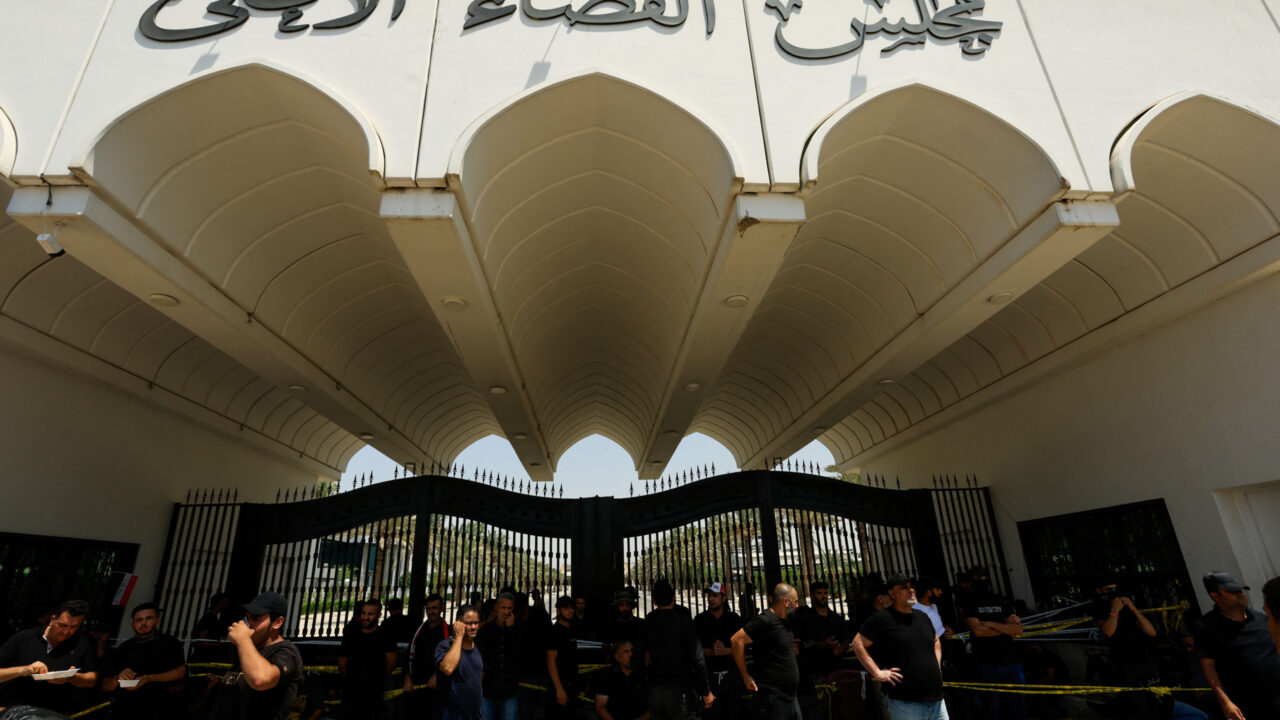Vote to nowhere: Why Iraq doesn’t need another snap election
Europeans should avoid supporting a snap election simply because a political leader is unsatisfied with the result of a government formation process and threatens violence in response
Iraqi politicians have spent much of the past year trying to form a government. Public frustration with their failure to do so has intensified, heightening the challenges to the legitimacy of the Iraqi state. Prominent leader Muqtada al-Sadr has gone from spearheading government formation efforts to calling for the overthrow of the political system. Since July, his supporters have been breaking into and occupying parliament. They are now demanding a new election. By contrast, Sadr’s rivals are calling for a dialogue, hoping to prevent further escalation by persuading him to return to the political process. Due to the severity of the current deadlock, a snap election appears to be the most likely outcome of the dispute. But there is little prospect that such a vote would provide a true way forward.
Given that Iraq’s parliamentary election in October 2021 had a low turnout, another one would risk eroding what is left of the country’s democracy – especially if it was held simply to placate Sadr. Turnout has been decreasing steadily since a boycott movement emerged in the 2018 election. In October 2021, turnout was 43.54 per cent overall and just 33.88 per cent in Baghdad. There is no reason to believe that another snap election would reverse this trend. Instead, it would further entrench parties whose corruption and patronage networks are tied to control of government ministries. In an environment characterised by widespread disillusionment with politics, only those who benefitted from these networks would feel compelled to vote.
There is little to suggest that Sadr would secure a parliamentary majority in a new vote
Iraq’s constitution lays out the timeline for the formation of a government, but has no mechanism to hold another election when this process fails. Sadr has attempted to strongarm the judiciary into dissolving parliament, to no avail. And he seems to regret forcing the MPs he controls to resign. He now aims to regain his parliamentary power while appearing to have made revolutionary changes to the political system. Therefore, another snap election would come in response to his machinations rather than more organic protests of the kind that led to the 2021 vote. Bowing to pressure from Sadr and his followers in an extra-constitutional manner would only damage Iraqi democracy.
To observers who are unfamiliar with Iraq or Sadr, it must be puzzling why a political leader whose party won more parliamentary seats than any of its rivals would force his MPs to resign and push for another election. However, he likely felt that he needed to act on his threat to remove his MPs from parliament and now hopes to win an outright majority or, at least, regain what he gave up.
Sadr has a habit of threatening to boycott the political process, often doing so just before an election. Usually, other political leaders plead with him to remain. But, this time around, they proceeded without him by swearing in new MPs and preparing a candidate for the premiership. He has rejected their subsequent offer of a dialogue, claiming it is disingenuous.
Sadr’s strategy involved pitching his revolutionary rhetoric to resonate with Iraqi Shias during the Ashura procession. He hoped to initiate and control a protest movement similar to the one that led to last year’s election. But the attempt has failed because most Iraqis are aware of the ways in which Sadr and his unruly followers use corruption and violence to achieve their political goals. Sadr was left in a position where he claimed to speak on behalf of ordinary Iraqis but, in reality, was just one more powerful figure stripping away the legitimacy of the state in an attempt to become Iraq’s top Shia political leader.
If there is another snap election, an unelected compromise candidate such as Mustafa al-Kadhimi will lead another interim government that merely prolongs Iraq’s political fragmentation and polarisation. Kadhimi lacks the parliamentary support he needs to implement much-needed reforms. However, no political bloc currently has the weight to impose its own candidate on parliament.
There is little to suggest that Sadr would secure a parliamentary majority in a new vote. Indeed, his opponents could gain more seats if they resolved some of the organisational problems they experienced in 2021. Meanwhile, non-partisan independent candidates and new political parties would likely perform worse than they did last year, as they would lack the political momentum they drew from the October 2021 protests.
Many Iraqi politicians and voters are under the mistaken impression that the international community is ready to engage with their affairs and mediate a compromise. For example, Sadr publicly criticised the United Nations Assistance Mission for Iraq after it ignored his request for it to oversee a dialogue between his movement and its rivals. Yet it is important for the long-term stability of Iraq – and, in turn, the region – that Iraqis achieve a consensus themselves rather than through foreign intervention.
Like all members of the international community, Europeans should avoid signalling to Iraqi politicians that they will support a snap election simply because a political leader is unsatisfied with the result of a government formation process and threatens violence in response. Although snap elections are an appropriate mechanism for resolving a deadlock in many democracies, they cannot address the structural weaknesses of Iraq’s political system. With the Iraqi public having long since lost faith in political leaders, it is vital that the international community avoids condoning their blatant attempts to subvert the electoral process.
The European Council on Foreign Relations does not take collective positions. ECFR publications only represent the views of their individual authors.



